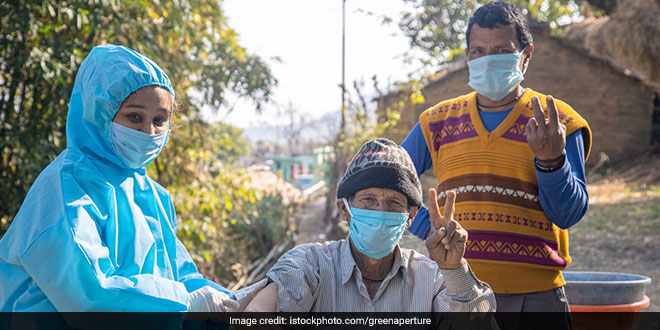Highlights
- India’s Coronavirus vaccination drive began on January 16
- In just 34 days, India has crossed the 1 crore milestone, succeeded by USA
- India aims to vaccinate around 22 per cent of the population in 7-8 months
New Delhi: In a little over a month’s time, India has crossed a significant milestone in its fight against the COVID-19 pandemic. According to the Ministry of Health and Family Welfare (MoHFW), as on February 19 (8 AM), India has administered over 1 crore (1,01,88,007) vaccine doses to healthcare and frontline workers. India took 34 days to achieve the feat of 1 crore vaccinations, the second fastest in the world, states the MoHFW. Currently, USA leads the charts with 31 days and United Kingdom (UK) is on number three as it took 56 days to vaccinate 1 crore individuals.
Also Read: COVID-19 Vaccines Myth Vs Fact: No Vaccines Do Not Alter DNA
India crosses a landmark milestone- More than 1 crore vaccine doses administered against #COVID19.
India took 34 days to achieve the landmark feat of 1 crore vaccinations, the second-fastest in the world. pic.twitter.com/QzZ2tupcUR
— Ministry of Health (@MoHFW_INDIA) February 19, 2021
Also Read: India To Multiply Vaccinations Amid Coverage Concerns
As per the official data, 1.01 crore vaccine beneficiaries include 62 lakh (62,60,242) healthcare workers who have received the first dose of the vaccine; 6.1 lakh (6,10,899) healthcare workers who have taken the second shot as well; 33 lakh (33,16,866) frontline workers having received the first dose.
A total of 1,01,88,007 vaccine doses have been administered through 2,11,462 sessions, as per the provisional report till 8 am today.
These include-
62,60,242 HCWs (1st dose),
6,10,899 HCWs (2nd dose),
33,16,866 FLWs (1st dose). https://t.co/2v1CZpsMmc pic.twitter.com/WeJDa4okau— Ministry of Health (@MoHFW_INDIA) February 19, 2021
Also Read: India Fights COVID-19: What Can Be Done To Speed Up Vaccination In The Country?
India’s vaccination drive which according to the government is the world’s largest vaccine drive kick started on January 16 with Prime Minister Narendra Modi giving it a green signal. In phase one of the vaccination drive, the priority is to vaccinate one crore healthcare workers. Following this, two crore frontline workers such as state and central Police department, armed forces, municipal workers and others will be vaccinated. After this, around 27 crore people above 50 years of age and less than 50 years with comorbidities will be vaccinated.
On February 2, India initiated vaccination of the frontline workers. The second dose of COVID-19 vaccination started on February 13 for those beneficiaries who have completed 28 days from the time they received the first dose.
In a video shared by the MoHFW, Dr VK Paul, Member (Health), NITI Aayog answered the much asked question – at the current speed of vaccination, how long will it take for India to be fully vaccinated. Dr Paul said,
The public health objective with which the current phase and wave of the vaccination program is rolling out, is to be able to cover 30 crore people who are the most vulnerable in the context of COVID-19 disease in about seven to eight months’ time. This would mean covering about 22 per cent people of India. Once this public health objective has been achieved, further vaccination rollout for the remaining population may be considered based on the situation with regard to the pandemic at that point in time and the anticipation to achieve herd immunity as one of the later goals. But at this point in time, the whole focus is to cover people above the age of 50 years who are proven to a very high level of mortality due to COVID-19 disease.
Herd immunity is a uniform amount of immunity that at least 60 to 70 per cent of the population in a community must develop to slow down the spread of infection. However, according to Dr Paul, the current public health goal is not to achieve herd immunity but to vaccinate individuals who have an excessive risk of mortality due to COVID-19. Currently, the government plans to protect the high risk group.
Also Read: COVID-19 Vaccine Explainer: How Do Vaccines Work?
NDTV – Dettol Banega Swasth India campaign is an extension of the five-year-old Banega Swachh India initiative helmed by Campaign Ambassador Amitabh Bachchan. It aims to spread awareness about critical health issues facing the country. In wake of the current COVID-19 pandemic, the need for WASH (Water, Sanitation and Hygiene) is reaffirmed as handwashing is one of the ways to prevent Coronavirus infection and other diseases. The campaign highlights the importance of nutrition and healthcare for women and children to prevent maternal and child mortality, fight malnutrition, stunting, wasting, anaemia and disease prevention through vaccines. Importance of programmes like Public Distribution System (PDS), Mid-day Meal Scheme, POSHAN Abhiyan and the role of Aganwadis and ASHA workers are also covered. Only a Swachh or clean India where toilets are used and open defecation free (ODF) status achieved as part of the Swachh Bharat Abhiyan launched by Prime Minister Narendra Modi in 2014, can eradicate diseases like diahorrea and become a Swasth or healthy India. The campaign will continue to cover issues like air pollution, waste management, plastic ban, manual scavenging and sanitation workers and menstrual hygiene.
[corona_data_new]



























